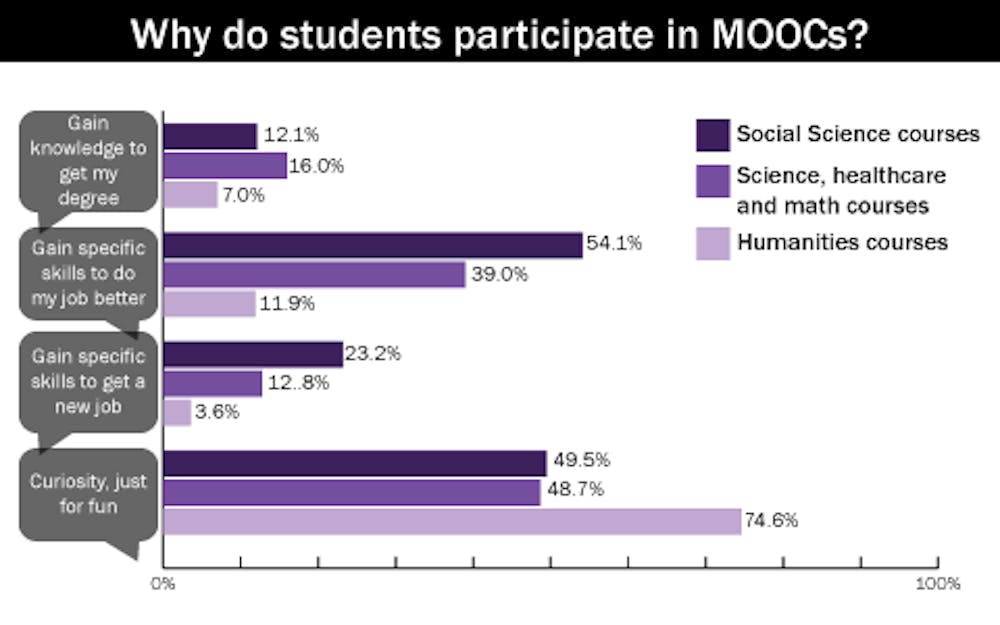
When Penn announced its partnership with massive open online course provider Coursera, in April 2012, administrators lauded the education startup as a way for the University to push its access agenda forward on a global scale. By making parts of a Penn education available to students worldwide, Coursera, administrators said, had the ability to revolutionize higher education.
More than a year and a half later, Coursera is still a long way from realizing that goal.
A new study, published last week by Penn researchers in the journal Nature, shows that students who have taken MOOCs on Coursera are highly educated and career-oriented. The study’s findings, though not necessarily surprising, will do little to win over MOOC critics, who argue that the online education hype in higher education has been largely overblown.

Researchers, led by Vice Provost for Global Initiatives Ezekiel Emanuel, conducted an online survey in July of nearly 35,000 students enrolled in at least one of the University’s 32 courses on Coursera.
Related: Wharton to feature core courses on Coursera
Across all geographic regions, the study found that MOOC students have high levels of educational attainment: 83 percent of those who responded said they had earned either a two- or four-year post-secondary degree, far more than international averages. Educational attainment disparities were especially pronounced in Brazil, Russia, India, China and South Africa, where about 80 percent of MOOC students — compared to just 5 percent of the populations in those countries as a whole — had earned post-secondary degrees.
The Coursera student population, in addition to being well-educated, also tends to be young, male and employed, according to the survey. More than 40 percent of MOOC students surveyed were younger than 30, and less than 10 percent were older than 60. About half of all students surveyed said they had enrolled in a MOOC because of “curiosity” or “for fun,” while 44 percent said they had made the decision to sign up in order to “gain specific skills to do my job better.”
Executive Director for Global Initiatives Gayle Christensen, a co-author of the study, said she had not expected the educational gap to be as large as it was, especially given the recent rhetoric around access issues and MOOCs.
Related: Penn Coursera course among first to be considered for credit
“While one may expect that students participating in MOOCs would be somewhat more likely to exhibit higher levels of education than the population writ large, the extent of this divide is greater than one might reasonably expect,” the authors wrote. “Despite the optimistic and aspirational declarations of many MOOC providers, these courses are not, as of yet, making education ‘borderless, gender-blind, race-blind, class-blind and bank account-blind.’”

The study, though limited in its scope and generalizability, provides some of the first publicly available data on who is taking MOOCs, and why they are taking them.
“What I take away from this is that, for MOOCs to change the world, there needs to be more than just high-quality digital content alone,” Law School professor Edward Rock, Penn’s director of open course initiatives, said. In order for MOOCs to reach their full potential, Rock said, institutions need to supplement their online learning ventures with on-the-ground, in-person partnerships and instruction.
Jonathan Moreno, a professor of ethics who has taught a Coursera course on neuroethics, agreed. Moreno, who said he would ideally like to have more data on who signs up for his MOOC, believes there is still a clear gap between an online course and a bricks-and-mortar classroom.
“The best thing is still to have somebody in front of you,” he said. “No amount of demographic information I have on who’s taking my MOOC can replace the look that a student has on their face when they’re sitting in front of you.”
The Daily Pennsylvanian is an independent, student-run newspaper. Please consider making a donation to support the coverage that shapes the University. Your generosity ensures a future of strong journalism at Penn.
DonatePlease note All comments are eligible for publication in The Daily Pennsylvanian.







